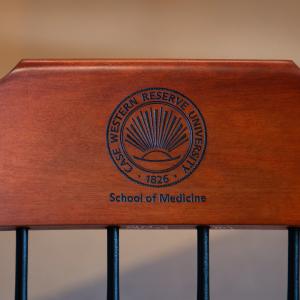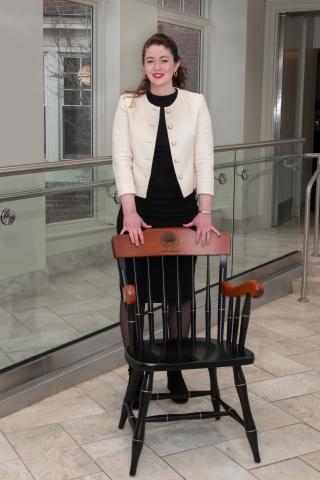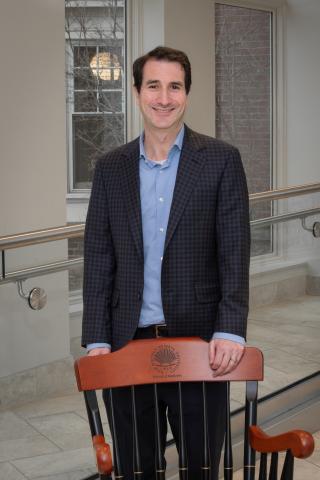Three endowed professorships bolster support for pathology research
For Clifford Harding, MD, PhD, the Joseph R. Kahn Professor and Chair of Pathology, and Mina Chung, MD, professor of medicine, establishing an endowed professorship at Case Western Reserve University School of Medicine was deeply personal.
“We have both been on faculty at CWRU since 1993,” Harding said of he and his wife. “This has been a great place for our academic careers, and we want to give back to the school in a meaningful way.”
Harding and Chung’s commitment is part of a collective effort by current and former pathology department faculty members and trainees to bolster support for neurodegeneration, cancer and immunology research. This shared vision resulted in the creation of three professorships in 2024 following the establishment of the Michael E. Lamm MD Designated Professorship in Pathology in 2023.
“Endowed professorships are crucial for our research programs,” said Harding. “They strengthen the school’s and university’s abilities to continue to develop its research mission and academic excellence.”
Harding sees these professorships as a testament to the “commitment, pride, appreciation, gratitude and dedication of the people who have been part of this department.”
Unraveling the mysteries of diseases
As the Clifford V. Harding and Mina K. Chung Professor in Pathology, Allison Kraus, PhD, is shedding new light on the underlying
causes of neurodegenerative diseases such as Alzheimer’s, Parkinson’s and other devastating brain disorders.
Central to her research are the “corrupted proteins” that misfold and accumulate in the brain, disrupting normal function and leading to cognitive decline. Using powerful microscopes and computational methodologies, Kraus and her team study the specific shapes and assembly patterns of these problematic proteins and use this knowledge to develop highly sensitive detection methods for the different misfolded protein assemblies.
Harding and Chung established the professorship Kraus holds to aid in the recruitment and development of research faculty in Case Western Reserve University School of Medicine’s Department of Pathology, with a specific focus on neurodegenerative disease.
“Dr. Kraus has developed ways to detect and measure specific pathogenic conformations and, importantly, translate those principles from prion disorders to the more common causes of dementia,” Harding said.
The professorship provides Kraus with the resources necessary to further this research and definitively unravel the mysteries of these diseases.
“The support this professorship provides allows us to pursue innovative research and rapidly generate critical data,” Kraus said. “I am deeply grateful for the value it brings to advancing this vital work.”
Developing life-saving therapies
David Wald, MD, PhD, is transforming cancer care by developing innovative therapies that empower the body’s own defenses to fight
disease. As the John D. Crissman and Francis D. Drake Professor in Pathology, Wald’s research emphasizes two main outcomes: improving cellbased immunotherapies and finding new drugs that can coax cancer cells to stop growing.
Wald and his team are investigating CAR-T cell therapy, a treatment that harnesses a patient’s own T-cells—which are genetically engineered to recognize and attack cancer. While this approach has shown promise, many patients still relapse. Wald is committed to making these cell therapies more potent and longer-lasting.
This bench-to-bedside research is made possible through the support of philanthropic partners John Crissman, MD (MED ’66), and Francis Drake, MD, who met during their pathology residencies at University Hospitals and became lifelong friends.
“Together, we decided to endow this chair to advance excellence in research and to support faculty who play a critical role in supporting our student’s academic goals,” said Crissman.
“Both of us have been very successful in our careers, and I am happy to support the institution that enabled my medical practice,” added Drake.
Wald recognizes that gifts like this professorship provide critical resources to pursue high-risk, highreward research with the potential to transform cancer treatment. “It’s an incredible opportunity to push the boundaries of what’s possible and improve outcomes for patients,” Wald said.
Restoring balance
As the world’s population ages, the devastating impact of Alzheimer’s disease continues to grow. Xiongwei Zhu, PhD, is working tirelessly to uncover the fundamental mechanisms driving this debilitating neurological disorder.
Zhu has dedicated his career to studying the role of mitochondria—the powerhouse of the cell—in the development and progression of Alzheimer’s. His research has shown that the normal ebb and flow dynamics of mitochondrial fusion and division in the diseased brain becomes severely disrupted.
“What we’ve found is that this mitochondrial dysfunction is a key driver of neurodegeneration in Alzheimer’s,” Zhu explained. “By restoring the balance of these dynamic processes, we may be able to prevent the death of brain cells and slow or even halt the disease.”
Now, through the establishment of the Clive R. Hamlin, PhD, Professorship in Pathology, named in honor of Professor Emeritus Clive Hamlin, PhD, Zhu’s research will have the sustained support needed to translate these findings into potential therapies.
“I am honored to be able to give back to the institution that has been my second home,” said Hamlin, whose distinguished career spans more than 50 years—including 30 as the laboratory director of the National Prion Disease Pathology Surveillance Center at CWRU.
“This endowed professorship will allow us to explore new frontiers in mitochondrial biology and Alzheimer’s disease,” Zhu said. “It’s an incredible honor, and I’m grateful for the opportunity to build on Dr. Hamlin's legacy of excellence."




